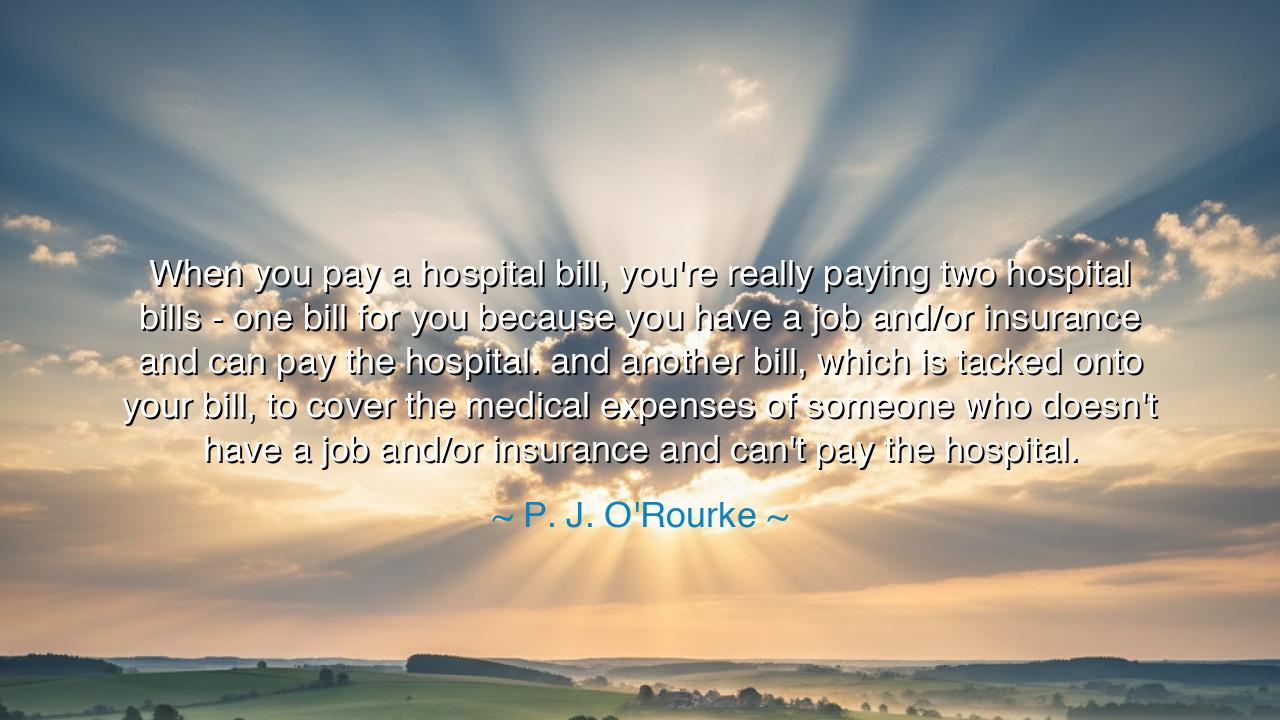
When you pay a hospital bill, you're really paying two hospital
When you pay a hospital bill, you're really paying two hospital bills - one bill for you because you have a job and/or insurance and can pay the hospital. and another bill, which is tacked onto your bill, to cover the medical expenses of someone who doesn't have a job and/or insurance and can't pay the hospital.






"When you pay a hospital bill, you're really paying two hospital bills—one bill for you because you have a job and/or insurance and can pay the hospital. And another bill, which is tacked onto your bill, to cover the medical expenses of someone who doesn't have a job and/or insurance and can't pay the hospital." These words from P. J. O'Rourke bring to light a harsh reality that many people face in the modern world—how the cost of healthcare is often inequitable, burdening those who can afford it to cover the needs of those who cannot. In a society where health should be a basic right and not a luxury, the system often forces people into unfair compromises, leaving individuals to carry the weight of not only their own medical expenses but the financial burden of others as well.
In the ancient world, healthcare was often tied to social and economic status. The Romans, for instance, had public baths and public health systems, but those who could afford better treatment had access to the best physicians and remedies. Similarly, the Egyptians had a class of priests who served as healers, with medical care being more accessible to the elite and less so to the common people. Medical knowledge was seen as both a privilege and a burden, with those in positions of power often receiving the highest quality care while the lower classes suffered from lack of access or were forced to rely on rudimentary treatments. In this sense, the disparity in healthcare access is not a new phenomenon but an ongoing struggle that has persisted throughout history.
This theme of inequality in healthcare can be seen throughout history. During the Middle Ages, plague and disease often decimated entire populations, but those who were wealthy had access to better care or the ability to flee from the dangers. It was only with the establishment of modern hospitals in the 18th and 19th centuries that care began to be more systematically provided, yet even in these institutions, there was a clear disparity between who received the best care and who was relegated to the margins. As O'Rourke points out, the very structure of healthcare systems often places an unfair burden on those who have the privilege of access, leading to a hidden cost that is borne by the most vulnerable.
Consider the example of Florence Nightingale, a nurse whose work during the Crimean War revolutionized the way hospitals were structured. Nightingale believed that healthcare should not be limited to the elite, but should be accessible to all, regardless of status. She worked tirelessly to improve hospital conditions and promote sanitation, focusing on the idea that good medical care was a universal right. However, even Nightingale’s advances were limited by the social and economic divides of her time. The privileged few still had access to the best care, while the majority suffered in poorly maintained hospitals or received substandard treatments. O'Rourke's point remains relevant even in today’s society, where unequal access to healthcare continues to be a pervasive issue.
As we move to the modern era, O'Rourke’s words cut to the heart of a broken system. The idea that those with insurance and jobs are forced to pay not only for their own care but for the uninsured as well highlights the structural inequities that exist within our healthcare system. We live in a world where medical care is often seen as a commodity—something that can be bought and sold, rather than a basic right. Those who are able to afford healthcare are burdened with the cost of those who cannot, further deepening the divide between the haves and the have-nots. The financial burden placed on those who are already struggling to make ends meet only worsens the inequities present in the system.
The lesson here is twofold: first, that healthcare, in its ideal form, should not be a privilege for some and a burden for others. The system should be designed to ensure equal access to care, regardless of a person’s financial status. And second, that the cost of healthcare must be rethought, as O'Rourke points out, so that the burden is not unfairly placed on those who are already paying for the system. Instead, a more equitable system must be established, one that offers access and fairness to all, regardless of income, job status, or insurance.
In our own lives, let us be conscious of the structural inequalities in the systems that shape our world. Whether in healthcare, education, or other vital areas of society, we must work to create equitable systems that ensure everyone has access to the care, opportunities, and resources they need. We must push for a society that no longer places the weight of injustice on those already burdened, but one where the privileges and burdens of society are shared fairly. Just as Florence Nightingale fought for the equality of healthcare in her time, so too must we strive for a world where healthcare is a universal right, not a commodity. The call to action is clear: let us create a future where everyone can access the care they deserve, without fear of bankruptcy or suffering due to their financial situation.






AAdministratorAdministrator
Welcome, honored guests. Please leave a comment, we will respond soon